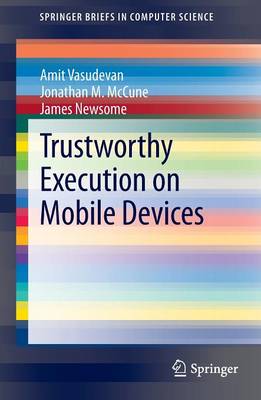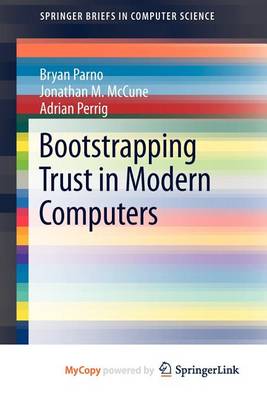SpringerBriefs in Computer Science
3 total works
Trustworthy Execution on Mobile Devices
by Amit Vasudevan, Jonathan M. McCune, and James Newsome
Published 11 August 2013
This brief considers the various stakeholders in today's mobile device ecosystem, and analyzes why widely-deployed hardware security primitives on mobile device platforms are inaccessible to application developers and end-users. Existing proposals are also evaluated for leveraging such primitives, and proves that they can indeed strengthen the security properties available to applications and users, without reducing the properties currently enjoyed by OEMs and network carriers. Finally, this brief makes recommendations for future research that may yield practical and deployable results.
Bootstrapping Trust in Modern Computers
by Bryan Parno, Jonathan M. McCune, and Adrian Perrig
Published 1 January 2011
Trusting a computer for a security-sensitive task (such as checking email or banking online) requires the user to know something about the computer's state. We examine research on securely capturing a computer's state, and consider the utility of this information both for improving security on the local computer (e.g., to convince the user that her computer is not infected with malware) and for communicating a remote computer's state (e.g., to enable the user to check that a web server will adequately protect her data). Although the recent "Trusted Computing" initiative has drawn both positive and negative attention to this area, we consider the older and broader topic of bootstrapping trust in a computer. We cover issues ranging from the wide collection of secure hardware that can serve as a foundation for trust, to the usability issues that arise when trying to convey computer state information to humans. This approach unifies disparate research efforts and highlights opportunities for additional work that can guide real-world improvements in computer security.
Practical Security Properties on Commodity Computing Platforms
by Amit Vasudevan
Published 25 September 2019
This SpringerBrief discusses the uber eXtensible Micro-hypervisor Framework (uberXMHF), a novel micro-hypervisor system security architecture and framework that can isolate security-sensitive applications from other untrustworthy applications on commodity platforms, enabling their safe co-existence. uberXMHF, in addition, facilitates runtime monitoring of the untrustworthy components, which is illustrated in this SpringerBrief. uberXMHF focuses on three goals which are keys to achieving practical security on commodity platforms: (a) commodity compatibility (e.g., runs unmodified Linux and Windows) and unfettered access to platform hardware; (b) low trusted computing base and complexity; and (c) efficient implementation.
uberXMHF strives to be a comprehensible, practical and flexible platform for performing micro-hypervisor research and development. uberXMHF encapsulates common hypervisor core functionality in a framework that allows developers and users to build custom micro-hypervisor based (security-sensitive) applications (called "uberapps"). The authors describe several uberapps that employ uberXMHF and showcase the framework efficacy and versatility. These uberapps span a wide spectrum of security applications including application compartmentalization and sandboxing, attestation, approved code execution, key management, tracing, verifiable resource accounting, trusted-path and on-demand I/O isolation.
The authors are encouraged by the end result - a clean, barebones, low trusted computing base micro-hypervisor framework for commodity platforms with desirable performance characteristics and an architecture amenable to manual audits and/or formal reasoning. Active, open-source development of uberXMHF continues.
The primary audience for this SpringerBrief is system (security) researchers and developers of commodity system software. Practitioners working in system security deployment mechanisms within industry and defense, as well as advanced-level students studying computer science with an interest in security will also want to read this SpringerBrief.
uberXMHF strives to be a comprehensible, practical and flexible platform for performing micro-hypervisor research and development. uberXMHF encapsulates common hypervisor core functionality in a framework that allows developers and users to build custom micro-hypervisor based (security-sensitive) applications (called "uberapps"). The authors describe several uberapps that employ uberXMHF and showcase the framework efficacy and versatility. These uberapps span a wide spectrum of security applications including application compartmentalization and sandboxing, attestation, approved code execution, key management, tracing, verifiable resource accounting, trusted-path and on-demand I/O isolation.
The authors are encouraged by the end result - a clean, barebones, low trusted computing base micro-hypervisor framework for commodity platforms with desirable performance characteristics and an architecture amenable to manual audits and/or formal reasoning. Active, open-source development of uberXMHF continues.
The primary audience for this SpringerBrief is system (security) researchers and developers of commodity system software. Practitioners working in system security deployment mechanisms within industry and defense, as well as advanced-level students studying computer science with an interest in security will also want to read this SpringerBrief.


